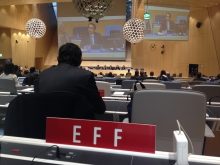EFF is in Geneva this week at the World Intellectual Property Organization (WIPO), where the organization's Standing Committee on Copyright and Related Rights is gathered to debate proposals for a treaty to give new legal rights to broadcasters, and for instruments that would standardize copyright limitations and exceptions for libraries, archives, educators and researchers.
More about those proposals will be coming in a series of updates this week. But first, why are we at WIPO at all? Here's a short history lesson to explain.
The DMCA's Origins at WIPO
Way back in 1995, the Clinton administration put forward a bill in Congress that would have placed new limits on the use and supply of devices that could be used to circumvent DRM, such as the DeCSS code that enabled DVDs to be played using free and open source software. The bill was immediately controversial, however, and never made it out of committee.
At the same time, the administration placed almost exactly the same proposal before WIPO. And it was there that a variation of the proposal passed the following year. Fast forward two more years, and the United States, now under an international legal obligation to amend its own laws to comply with the new WIPO Copyright Treaty, passed its own law to outlaw copyright circumvention devices, in the form of the Digital Millennium Copyright Act (DMCA).
You can probably see what they did there. Depressingly, because it's not the only time such a sneaky run around Congress has happened, this kind of policy stunt even has a name. We call this policy laundering.
But if you think that this makes WIPO delegates the bad guys, that's not the whole story. In fact, if it wasn't for interventions made at WIPO by tech companies, public interest organizations, such as the American Library Association, and a number of countries, the result would have been even worse—a lot worse. For example, the US had also been asking WIPO to make temporary copies illegal and to introduce new rights over databases, both of which proposals were rejected. Additionally, the anti-circumvention language was watered down from the US's initial, even more extreme DRM proposals.
Moderate voices also managed to achieve the inclusion of some positive language in the WIPO Copyright Treaty that we can rely upon today to advocate for new copyright flexibilities suited for the digital age:
It is understood that the provisions of Article 10 permit Contracting Parties to carry forward and appropriately extent into the digital environment limitations and exceptions in their national laws which have been considered acceptable under the Berne Convention. Similarly, these provisions should be understood to permit Contracting Parties to devise new exceptions and limitations that are appropriate in the digital network environment.
WIPO at a Crossroads

The fact that WIPO is not simply rubber-stamping maximalist copyright proposals is a good thing, but it does have two negative side effects.
The first is that the division between maximalists on the one hand, and moderate or pro-development voices on the other, has created a stalemate at the organization over a number of proposals made by either side. On the maximalist side, this includes the Treaty on the Protection of Broadcasting Organizations. On the other side, it includes the discussions on instruments on copyright limitations and exceptions, including those for libraries and archives, and for educational and research uses. At present, both sets of proposals are equally stalled.
The second and related problem that WIPO has encountered is that the difficulty of promoting their agenda within WIPO has left the maximalists to seek other venues, that are further away from public scrutiny and review and more receptive to their extreme rent-seeking proposals.
Thus almost two decades from its original digital proposals to WIPO, US negotiators are still singing the same tune—pushing other countries to adopt tough new rules on anti-circumvention, and at least until recently, to make temporary copies illegal. But rather than doing this at WIPO where negotiations take place in the open and where dissenting voices can be heard, they have shifted their attention to the more exclusive club of free trade agreements such as the Trans-Pacific Partnership (TPP).
That's why EFF is at WIPO this week; because for all its faults and limitations (and they are many), it's a venue where we have the right to speak and to listen, and where the bad proposals that our representatives put forward can be openly picked apart and critiqued. Sometimes, we can even win—as with the passage of the Marrakesh Treaty formally known as the Treaty to Facilitate Access to Published Works by Visually Impaired Persons and Persons with Print Disabilities. It was the first international treaty of its kind to enact strong rights for end-users of copyrighted works.
We don't expect to achieve any such big wins this week. But we do intend to stake a claim to the conversation, ensuring that the perspectives of ordinary users and innovators are heard. Check back throughout the week as we report on the status of negotiations here in Geneva.








